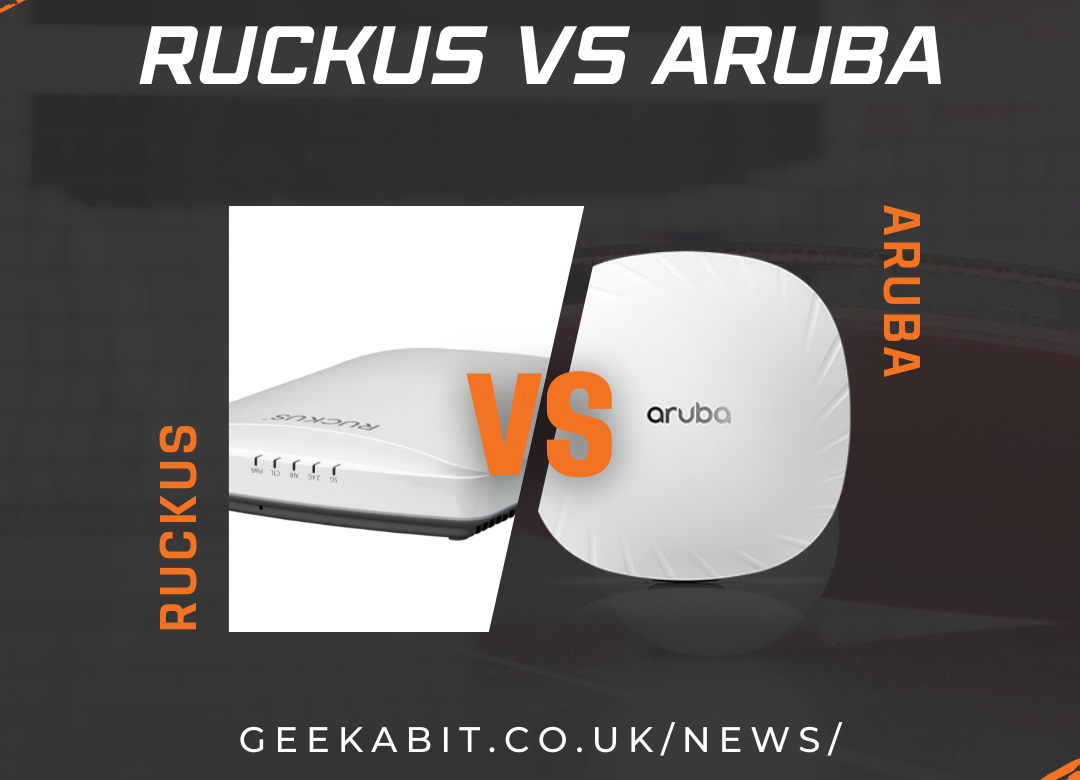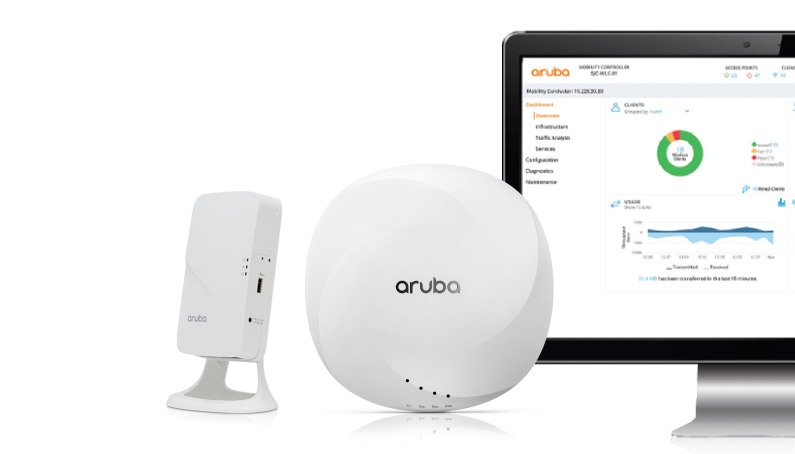Which AP is best for your network – Ruckus or Aruba?
With a wireless market saturated by Access Points and other Wi-Fi hardware, we don’t blame you for wondering which one would be best matched to your network.
Generally, going for quality is a good place to start if you want your network to function well. There are of course many quality brands manufacturing Access Points, but for the purpose of this article we’re going to take a look at Ruckus and Aruba. Both of these brands have advantages and disadvantages – It’s just a case of comparing these characteristics with your network requirements and determining which would be the best match
What are the main functions of and differences between Ruckus and Aruba?
Ruckus
Let’s start with Ruckus. Ruckus is developed for high density indoor environments, with Access Points that offer dual band Wi-Fi (meaning they can support both the 2.4 GHz and 5 GHz bands). Ruckus AP’s also have MU-MIMO (multiple user MIMO) capability, meaning they can transmit data to multiple devices simultaneously.
Network Management Options
Ruckus network environments can be managed by on-site or remote controllers for hardware, cloud, virtual, clustered or standalone.
Network Security
Ruckus AP’s have Dynamic PSK™ Encryption KEy tEchnology. Dynamic pre-Shared Key (pSK) is a patented technology developed to provide robust and secure wireless access while eliminating the arduous task of manual configuration of end devices and the tedious management of encryption keys. You can read more about this on the Ruckus Networks data sheet here.
Ruckus AP’s also support BYOD technology which is now prevalent across business networks (Bring Your Own Device – when employees use their own personal devices to connect to the organisation’s network and access what they need to do their jobs).
Network Performance
Ruckus’ patent-pending SmartCast technology combines innovative multicast traffic handling techniques, smart QoS, and application-aware traffic classification capabilities, for top-quality Wi-Fi video transmissions for things like surveillance.
Ruckus also utilises BeamFlex, a combination of multiple high-gain polarized antenna elements and patented software algorithms that are combined in real time to offer an exponential increase in performance.
Aruba
Aruba is developed for high density environments, with Access Points that offer dual band Wi-Fi (meaning they can support both the 2.4 GHz and 5 GHz bands like Ruckus). Aruba AP’s also have MU-MIMO (multiple user MIMO) capability, meaning they can also transmit data to multiple devices simultaneously.
Network Management Options
Aruba network environments can be managed via Cloud, Local or on-premises.
Network Security
Aruba has the standard network security functions that can be expected for Wi-Fi hardware, such as VPN, Firewall, Unlimited intrusion prevention etc.
Network Performance
Aruba uses Beam forming technology, With beamforming, the access point knows where a Wi-Fi device is located and sends the Wi-Fi signal specifically in that direction. The function thus provides fast, strong Wi-Fi signals and great coverage for each device.
Ruckus vs. Aruba – Let’s Compare
So now we know the general functions of both Ruckus and Aruba AP’s, let’s specifically look at how they compare to each other.
Ruckus vs Aruba – Network Performance
Winner: Ruckus
In terms of Access Points, Ruckus Access Points have better optimal performance and higher network efficiency than that of Aruba.
The reason for this lies in the AP’s Radio Frequency Technology. As mentioned above, Ruckus AP’s use BeamFlex technology. Standard Beamforming in 802.11ac (like what Aruba uses) is a radio based technology. BeamFlex is an antenna based technology that engages adaptive antennas. The difference between the two is that Ruckus uses beamforming (which is radio based) and combines it with adaptive antennas (BeamFlex which is antenna based) which therefore maximises the performance of the AP.
Performance is optimised by increasing radio capacity and reducing co-channel interference which leads to the enjoyment of a seamless network. Not only that, but Ruckus can transmit IPTV (internet protocol television) for your multimedia applications.
Ordinarily, Ruckus performs client load balancing, and it is equipped with airtime fairness to promote Wi-Fi to your slow device. In addition, it also has smart support for apps and frequency band control, allowing your dual-band device to connect to the 5 GHz frequency band to improve network efficiency.
In comparison, Aruba uses traditional beamforming technology. This enables the AP to concentrate the signal on your device, which also provides a stable network.
Ruckus vs Aruba – Network Security
Winner: Aruba
When it comes to a more secure network, Aruba has the edge over Ruckus.
Aruba’s security protocol has been standardised through 802.11 I (IEEE 802.11i-2004, or 802.11i for short, is an amendment to the original IEEE 802.11, implemented as Wi-Fi Protected Access II (WPA2). It also provides a strong firewall in the Aruba mobile controller.
Ruckus also has its good points when it comes to network security. Ruckus offers BYOD technology and DPSK patented technology (as explained above), which work together to ensure that your network has a subtle level of security.
Ruckus vs Aruba – Overall
Ruckus’ innovative and personalised antenna ray is used to extend the signal range and increase client data for wireless video, voice and data technology. This eliminates Wi-Fi interference and ensure a reliable and strong Wi-Fi network for your smart Wi-Fi devices.
You can find Ruckus AP’s on their website here.
All of Aruba access points use AI-driven radio frequency optimization, intelligent management, dynamic segmentation, and intelligent operation of a wealth of users and applications. In addition, they have been optimised to support IoT devices running Wi-Fi, Bluetooth, Zigbee and other third-party protocols.
You can find Aruba’s AC’s on their website here.
So which is best for your network – Ruckus or Aruba?
As we’ve outlined in this article, you can find unique features in both Ruckus and Aruba hardware that help to optimise performance.
Both Ruckus and Aruba have unique features used for optimal performance. Overall, it would seem however that Ruckus can provide you with a more stable and faster network than Aruba. Ruckus maintains performance in high-density environments and offers patented technology to increase network performance.
Don’t forget that it comes down to your own network requirements as to which one you should go for. If you’re not sure, then reach out to the experts!
Geekabit Wi-Fi Experts
Our expert Wi-Fi engineers are on hand to survey, design and deploy a Wi-Fi network to meet your business needs.
Get in touch with our friendly team today here.


